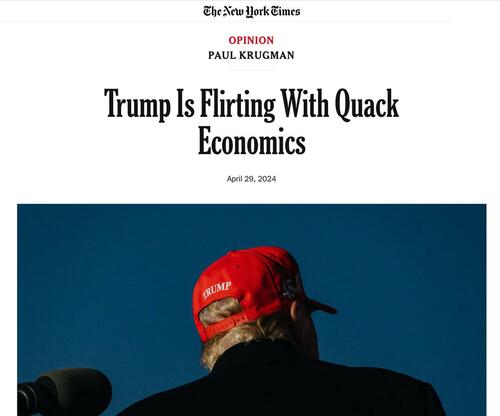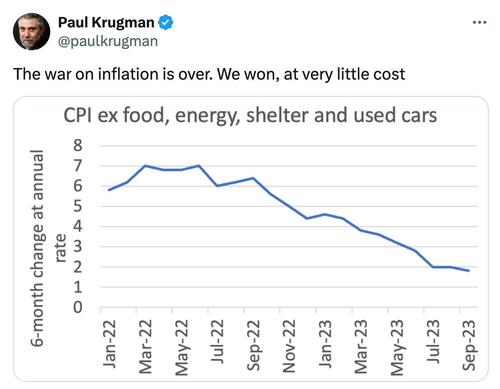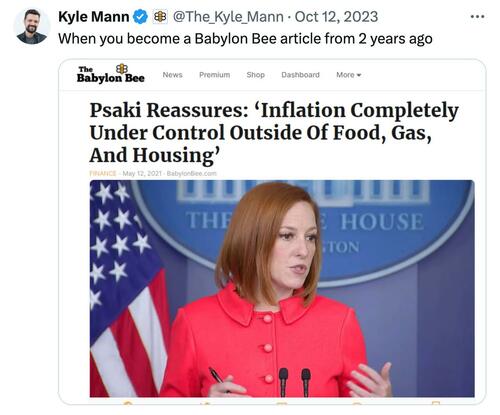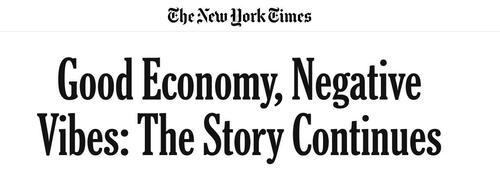Paul Krugman’s Magical Thinking: Taibbi
Authored by Matt Taibbi via Racket News,
Last week, in “It’s Not Me, It’s You,’” I wrote about a booming new op-ed genre, the editorial that bashes hick voters for their incorrect “Perception of the Economy.” Pundits attack voters’ “stubbornly low” assessments, producing poll numbers that leave experts “baffled” and wondering when people will catch up to “reality.”
In a bit of Racket malpractice, the article didn’t mention Paul Krugman of the New York Times, who’s written a collection of those articles and become the unofficial tribune of the “Perception of the Economy” movement. As scientists in classical times believed the sun revolved around the earth, Krugman believes all things revolve around Donald Trump, the subject of this recent piece of wizardry:
Krugman’s “quack economics” fears are prompted by a Wall Street Journal report claiming Trump advisers are “quietly drafting proposals that would attempt to erode the Federal Reserve’s independence” if Trump wins in November. As the Times “Dealbook” page surmised, “The overall goal is to give Trump what he wants: more say on interest rates,” with those unnamed sources claiming Trump aides discussed requiring Fed officials to consult with the president before raising or lowering rates.
Krugman spins a series of elaborate nightmare hypotheticals on the basis of this one piece of information, concluding:
How would Trump respond if things went wrong? Remember, he suggested we look into fighting Covid by injecting disinfectant. Why expect him to be any less inclined to magical thinking in dealing with, say, a new surge in inflation?
Paul Krugman, worried about a magical thinking response to a “surge in inflation.” Why would that be funny? Let’s review:
Six months ago, Krugman made an announcement on Twitter. “The war on inflation is over,” he declared. “We won, at very little cost.” The pronouncement stood like the Colossus of Rhodes over a heroic graph:
This was the economic equivalent of George Bush’s “Mission Accomplished” stunt. Krugman graphed the Consumer Price Index excluding “shelter, food, and used cars.” The CPI, which ostensibly tracks changes in the price of consumer goods, is already a quasi-bogus number whose quirky methodology allows government to make prices seem lower. That wasn’t enough for Krugman, who simply removed three of the biggest household spending variables to take the real CPI of 3.7% and jam it below 2%, creating his own bespoke inflation monitor.
Krugman was instantly mocked, even by other mainstream outlets. “Nobel Economist Paul Krugman Mocked For Saying Inflation is Over if You Exclude Most of What People Buy,” was the take in Business Insider. “Inflation is not a problem if you don’t buy anything,” added TalkMarkets. The funniest response showed Krugman had zoomed past The Onion and become a Babylon Bee headline:
Krugman backpedaled slightly, but couldn’t help himself and went back month after month to argue the numbers were better than they seemed. In January, he posted the “NY Fed measure of underlying inflation” to confirm “the war is over, and we won.” In February, for instance, he posted a chart reminding us that “if it weren’t for owners’ equivalent rent, a price nobody pays, nobody would be talking about inflation.”
All this came a year after he had to write a column called “I Was Wrong About Inflation,” admitting to being on “Team Relaxed” when it came to the potential downside impact of a massive monetary rescue plan. One of the reasons for his miscalculation? “A big piece of the plan was one-time checks to taxpayers, which we argued would be largely saved rather than spent.”
Krugman calculates consumer prices without housing or food and assumes people in the middle of an economic crisis won’t spend six hundred bucks, but thinks other people are guilty of magical thinking on inflation?
Putting a bow on all this, in the “magical thinking” piece Krugman indulged in a catastrophic fantasy about Trump potentially devaluing the dollar to stimulate exports, an idea he ripped as “clearly inflationary — raising import prices and overheating a U.S. economy that is already running hot.” One can only assume he means hot in the Goldilocks sense, i.e. not too much inflation, and not too little, but just hot enough.
One last note. Krugman rails against Trump’s reported plans to expand tariffs. This is interesting because when Joe Biden told the World Trade Organization to shove it a year and a half ago after the WTO declared Trump’s last tariff regime (which Biden was continuing) illegitimate, Krugman declared, “It’s up to America to determine whether its trade actions are necessary for national security,” and “an international organization has no right to second-guess that judgment.” This came in an article showing Biden speaking sternly into a microphone with a big ‘Murican flag in the background, titled, “Why America is Getting Tough on Trade.”
I’m not endorsing any of Trump’s economic ideas, but the issue here is the naked partisanship of Krugman’s act. When Trump was in office, he was writing articles like “Why is Trump a Tariff man?” and declaring that his tariffs were about “rewarding his friends,” “power,” and “cronyism,” rather than any kind of populist policy (because Trump voters are “driven more by animosity toward immigrants and the sense that snooty liberals look down on them than by trade policy”). When Biden’s in office, extending the exact same tariffs, Krugman waves the flag and hums Lee Greenwood for his “tough America” columns. Now we’re back to worrying about Trump’s “magical thinking” and “petty strongman” tendencies.
This is worth pointing out only because partisan pettiness has become the default explanation for those “perception of the economy” pieces I wrote about last week. Krugman has hit this theme countless times, most recently in early April:
Quoting the Wall Street Journal in saying, “When it comes to the economy, the vibes are at war with the facts,” Krugman adds:
The elephant in the room — and it is mainly an elephant, although there’s a bit of donkey too — is partisanship. These days, Americans’ views of the economy tend to be determined by political affiliation rather than the other way around… Republican politicians and media are united in trashing the Biden economy… Democrats, on the other hand, are divided, with some progressives talking down the economy because they fear that acknowledging the good news might undermine the case for strengthening that weak social safety net.
Got that? Ordinary people don’t have honest opinions about the economy, just partisan reactions, and when progressives say negative things, it’s only because they’re lying for a good cause, i.e. stumping for a wider safety net. Everybody is dishonest except the experts like Krugman, who have facts where the volk only have vibes, and wrong ones at that.
What’s so irritating about the “partisan divide in economic perceptions” becoming the reigning explanation for negative public attitudes about the economy is that they’re such obvious projection. With Trump on the ballot this November, no mainstream pundit will dare speak ill of Joe Biden’s economy, whether it deserves it or not, which is both confusing and galling to audiences, and almost certainly adds to the hesitancy reflected in the polls. How can anyone feel good about things if they sense the “experts” wouldn’t tell them even if they saw a crash coming?
It’s one thing to be called stupid and partisan, but having Paul Krugman do it is almost a compliment. Almost.
Tyler Durden
Thu, 05/02/2024 – 18:55
via ZeroHedge News https://ift.tt/yLPIYg6 Tyler Durden



